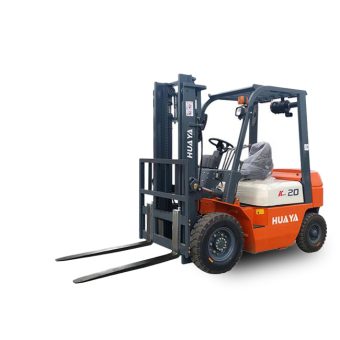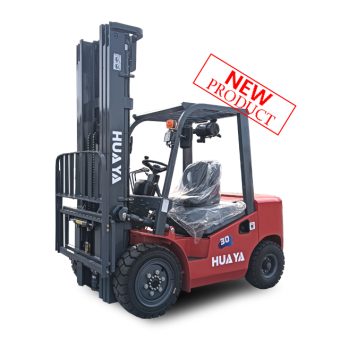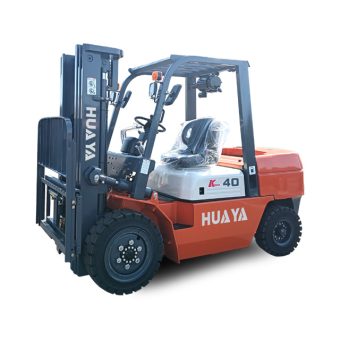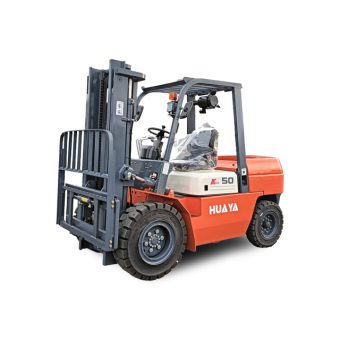
Actualités
Les entrepôts sont le cœur battant de la logistique moderne et des chaînes d'approvisionnement. De la manutention de palettes en vrac au chargement de matériaux de construction lourds, les exigences en matière d'équipement d'entrepôt sont élevées et variées. Parmi les nombreux types de chariots élévateurs disponibles, les chariots élévateurs diesel s'imposent systématiquement comme une solution de choix pour des performances industrielles.
Les chariots élévateurs diesel offrent un couple élevé et une capacité de levage robuste, ce qui les rend parfaits pour les tâches impliquant des charges lourdes et des cycles de levage fréquents. Contrairement à leurs homologues électriques plus petits, les machines à moteur diesel sont conçues pour un travail dur et continu. Si votre entrepôt manipule régulièrement des matériaux denses (bobines d'acier, grandes marchandises palettisées, matériaux de construction ou machines), le moteur d'un chariot élévateur diesel fournit la force nécessaire pour soulever des poids plus lourds avec stabilité et contrôle.
Avantages :
Couple supérieur pour le levage de charges lourdes.
Performances fiables en cas de cycles continus et intensifs.
Moins de stress dû à la chaleur et moins de baisse de performance lors des longues périodes de travail.
Les chariots élévateurs diesel sont conçus pour résister à des conditions de travail difficiles. Leur châssis, leur chaîne cinématique et les composants de leur moteur sont conçus pour durer - un avantage essentiel dans les entrepôts qui exposent les équipements à des surfaces rugueuses, à des débris et à un usage intensif. Lorsque les temps d'arrêt sont coûteux, la construction robuste d'un chariot élévateur diesel réduit la fréquence des réparations et des pannes inattendues.
Avantages en termes de durabilité :
Châssis robuste et composants de transmission résistants.
Les moteurs sont conçus pour fonctionner en continu.
Souvent plus grande résistance aux chocs et à l'usure dans les environnements extérieurs ou semi-extérieurs.
Bien que le prix du carburant diesel fluctue selon les régions, les moteurs diesel ont tendance à être plus économes en carburant lorsqu'ils effectuent des tâches de grande puissance que les moteurs à gaz ou à GPL de taille similaire. Pour les entrepôts qui fonctionnent en équipes longues ou multiples, les chariots élévateurs diesel permettent de réduire les coûts de carburant par heure de production, en particulier lorsqu'ils manipulent des charges lourdes ou effectuent des levées répétées.
Notes sur l'efficacité :
Les moteurs diesel convertissent une plus grande partie de l'énergie du carburant en travail utilisable à des charges plus élevées.
Dans les scénarios d'utilisation intensive en plusieurs équipes, l'économie totale de carburant favorise souvent le diesel.
Les chariots élévateurs électriques à batterie nécessitent des temps d'arrêt pour la recharge ou des systèmes de changement de batterie coûteux pour un fonctionnement continu. Les chariots élévateurs diesel évitent cette contrainte : le ravitaillement en carburant est rapide et simple, et un seul réservoir peut souvent soutenir une équipe complète (ou plus) en fonction de la charge de travail et de la taille du moteur. Pour les entrepôts où le temps de fonctionnement est crucial et où l'espace pour changer de batterie est limité, les machines diesel assurent la fluidité des opérations.
Avantages opérationnels :
Rechargement rapide par rapport aux temps de charge de la batterie.
Il n'est pas nécessaire de disposer d'une grande infrastructure de stockage ou de chargement des batteries.
Durée de fonctionnement constante pendant les quarts de travail intensifs.
De nombreux entrepôts comprennent à la fois des zones de stockage intérieures et des quais de chargement ou des cours extérieures. Les chariots élévateurs diesel sont bien adaptés aux environnements mixtes : ils supportent les surfaces extérieures irrégulières et traversent les cours plus facilement que de nombreux modèles électriques, tout en restant fiables sur les quais de chargement. Pour les installations où les chariots élévateurs doivent fréquemment se déplacer entre l'intérieur de l'entrepôt et les zones extérieures, un modèle diesel offre de la flexibilité sans sacrifier la capacité.
Points pratiques :
Traction et puissance accrues sur les surfaces irrégulières ou non pavées.
Moins de sensibilité aux températures extrêmes qui peuvent affecter les performances de la batterie.
Idéal pour le chargement/déchargement de camions sur des quais semi-couverts ou en plein air.
Lors de l'évaluation de l'acquisition d'un équipement, le prix d'achat n'est qu'une partie de l'histoire. Le coût total de possession comprend le carburant, l'entretien, la durée de vie, les temps d'arrêt et la valeur de revente. Les chariots élévateurs diesel ont généralement :
Valeurs de revente compétitives pour les modèles lourds.
Intervalles d'entretien plus longs pour les principaux composants lorsqu'ils sont correctement entretenus.
Des coûts de maintenance prévisibles et une vaste chaîne d'approvisionnement mondiale pour les pièces et les services.
Alors que les chariots élévateurs électriques peuvent réduire les coûts d'exploitation quotidiens dans certains scénarios d'utilisation légère en intérieur, les chariots élévateurs diesel présentent souvent un coût total de possession inférieur pour les opérations d'entrepôt à usage intensif, en particulier si l'on tient compte de la productivité et de la durée de fonctionnement.
Les techniciens connaissent bien les moteurs diesel, dont les procédures d'entretien sont bien établies et normalisées dans de nombreuses marques. L'entretien est donc plus rapide et l'approvisionnement en pièces détachées plus facile dans la plupart des régions. Un entretien préventif régulier - vidange d'huile, remplacement des filtres et contrôles réguliers du moteur - permet aux chariots élévateurs diesel de fonctionner au maximum de leurs capacités et d'éviter les pannes coûteuses.
À quoi s'attendre ?
Simplification de l'entretien sur le terrain dans de nombreux marchés.
Nombreuses pièces de rechange et assistance après-vente.
Longue durée de vie grâce à un entretien préventif adéquat.
Les chariots élévateurs diesel modernes sont dotés d'une conception ergonomique et de dispositifs de sécurité comparables à ceux des modèles électriques. Les sièges à suspension, les lignes de visibilité claires, les mâts de conception avancée et les fonctions d'assistance à l'opérateur améliorent la sécurité et réduisent la fatigue de l'opérateur, ce qui est important dans les entrepôts très fréquentés où les équipes sont longues et où les erreurs peuvent coûter cher.
Points forts en matière de sécurité :
La stabilité des performances sous charge réduit le risque de basculement.
Les cabines confortables et les commandes intuitives réduisent la fatigue de l'opérateur.
Des aides modernes à la sécurité - alarmes de secours, lumières et capteurs - sont couramment disponibles.
Les moteurs diesel produisent des émissions, ce qui est important pour la qualité de l'air intérieur et la conformité aux réglementations. De nombreux chariots élévateurs diesel modernes répondent désormais à des normes d'émissions plus strictes (par exemple, Tier 4 sur certains marchés) et intègrent des technologies de combustion plus propres. Pour les entrepôts où la qualité de l'air intérieur est très préoccupante, les solutions consistent à utiliser les chariots élévateurs diesel dans des zones extérieures ou à mettre en place une ventilation robuste. Une autre option consiste à envisager des modèles diesel plus récents dotés de systèmes de post-traitement ou à équilibrer la composition du parc (diesel pour les travaux lourds à l'extérieur, électrique pour les tâches légères à l'intérieur).
Atténuations pratiques :
Les machines diesel doivent être utilisées principalement à l'extérieur ou dans des espaces bien ventilés.
Investissez dans des modèles diesel qui respectent les normes d'émission en vigueur.
Combiner stratégiquement les flottes diesel et électrique pour atteindre les objectifs environnementaux.
Malgré leurs nombreux avantages, les chariots élévateurs diesel ne conviennent pas à tous les entrepôts. Si votre installation est entièrement fermée et mal ventilée, ou si votre priorité est l'absence d'émissions sur le site (par exemple, stockage de produits alimentaires sensibles ou salles blanches), les chariots élévateurs électriques peuvent s'avérer plus efficaces. De même, si vos activités sont principalement légères et axées sur des quarts de travail courts, les options électriques peuvent offrir des coûts permanents moins élevés et un fonctionnement plus silencieux.



